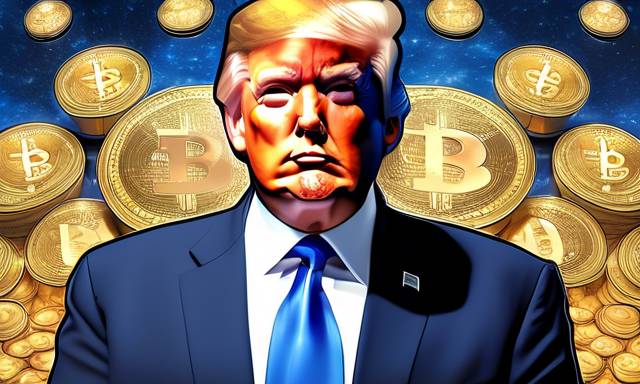Understanding Trump’s Embrace of Crypto Donations 💰
The recent political landscape illustrates a noteworthy influx of cryptocurrency donations to a political action committee (PAC) that supports former President Donald Trump. Approximately $7.5 million has been mobilized through various digital currencies, reflecting a significant connection between Trump’s campaign and the crypto community in this year’s electoral process.
Key Highlights of Crypto Contributions 📊
- The Trump 47 joint fundraising committee, in a filing with the Federal Election Commission (FEC), disclosed donations comprising Bitcoin, Ether, XRP, and stablecoins like Tether and USDC.
- The documented donations cover the period from July 1 to September 30, presenting a cumulative view over time.
Crypto Community’s Influence in the 2024 Election 🗳️
As the 2024 presidential election draws nearer, Donald Trump appears to significantly depend on the support from cryptocurrency enthusiasts. His recent pivot towards a pro-cryptocurrency stance marks a noteworthy evolution from his previous reservations during his administration.
In May, Trump made headlines as the first leading presidential contender to welcome contributions in digital currencies, marking a shift that aligns with the increasing prominence of crypto in political finance.
The Volatility of Donations: Significant Numbers 📈
A report from the watchdog organization Public Citizen reveals that nearly 50% of the corporate finances propelling the current election cycle emanate from the crypto industry. Major players like Coinbase, Ripple, and Andreessen Horowitz have emerged as leading contributors in this financial landscape.
This year, donations from the crypto sector are around 13 times greater compared to what was amassed during the previous presidential election cycle.
Cumulative Contributions Revealed 💵
- The Trump 47 filing unveiled that at least 18 donors have contributed upwards of $5.5 million in Bitcoin.
- Additionally, seven individuals have donated around $1.5 million in Ether, indicating strong backing from the crypto community.
- These supporters represent an impressive range of locations, spanning over 15 states, including critical battleground states and even Puerto Rico.
Diverse Donor Profiles 🌍
The contributors to Trump’s campaign come from various professional backgrounds, spanning software engineers to producers in entertainment. Notable among these is David Bailey, CEO of BTC Inc., who has made a significant contribution exceeding $498,000 in Bitcoin.
Moreover, new entrants such as Chase Herro, a co-founder of the Trump family’s crypto initiative, are venturing into the fundraising space. His initiative, World Liberty Financial, aims to stand as a decentralized banking platform for cryptocurrency transactions, and although it has launched its token sale, it has encountered difficulties—only $10.2 million raised out of a $300 million target so far.
Other Key Crypto Donors in the Scene 🌟
Among the other substantial contributors is Mike Belshe, CEO of BitGo, who has donated nearly $100,000 in Bitcoin. Brian Murray from Craft Ventures added $6,560 to the fund, while Kresus Labs founder Trevor Traina and Chainstone Labs CEO Bruce Fenton have also made notable contributions.
Stuart Alderoty, who holds the position of Chief Legal Officer at Ripple, donated $300,000 in XRP. He attended a significant Trump fundraising event hosted by venture capitalist David Sacks earlier this year. This backdrop creates an intriguing contrast against Chris Larsen, co-founder of Ripple, who has publicly backed Vice President Kamala Harris through the Future Forward super PAC.
Hot Take: The Future of Crypto in Politics 🌐
The evolving relationship between cryptocurrency and political fundraising heralds a new era where digital assets play a pivotal role in electoral campaigns. As more candidates acknowledge the financial clout and engagement of the crypto community, anticipate shifts in both policy and strategy leading up to election day this year. While cryptocurrency continues to challenge traditional finance paradigms, its influence on contemporary political mechanisms cannot be understated.
In summary, the intersection of cryptocurrency and politics exemplifies how evolving financial technologies can interact with and influence electoral processes. Understanding these dynamics is crucial for grasping the future landscape of campaign financing.





 By
By
 By
By
 By
By

 By
By
 By
By